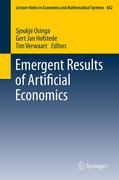
Emergent results of artificial economics
Osinga, Sjoukje
Hofstede, Gert Jan
Verwaart, Tim
Artificial economics is a computational approach that aims to explain economic systems by modeling them as societies of intelligent software agents. The individual agents make autonomous decisions, but their actual behaviors are constrained by available resources, other individuals' behaviors, and institutions. Intelligent software agents have communicative skills that enable simulationof negotiation, trade, reputation, and other forms of knowledge transfer thatare at the basis of economic life. Incorporated learning mechanisms may adaptthe agents' behaviors. In artificial economics, all system behavior is generated from the individual agents' simulated decisions; no system level laws are a priori imposed. For instance, price convergence and market clearing may emerge, but not necessarily. Thus, artificial economics facilitates the study of the mechanisms that make the economy function. This book presents a selection of peer-reviewed papers addressing recent developments in this field between economics and computer science. New original papers in the rapidly developing field of artificial economics. Interdisciplinary approach between computational economics and computer science. Theory and applications of artificial markets. INDICE: Preface. Part I: Human in the System. Part II: Financial Markets. Part III: Organization Design. Part IV: Macroeconomics. Part V: Market Dynamics. Part VI: Games.
- ISBN: 978-3-642-21107-2
- Editorial: Springer Berlin Heidelberg
- Encuadernacion: Rústica
- Páginas: 200
- Fecha Publicación: 31/07/2011
- Nº Volúmenes: 1
- Idioma: Inglés
